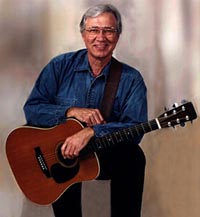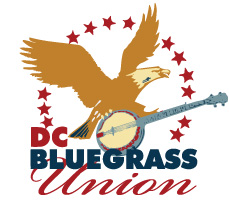Cliff Waldron
By Steve Romanoski (with permission)
 Over the years, the punchy rhythmic introduction to “Fox On The Run” has become a virtual call to arms in the bluegrass community, And, while the tune will be forever linked to the classic Country Gentlemen ensemble of the early 1970s, another Washington DC based band was responsible for the song’s introduction to bluegrass. That band was simply called Emerson & Waldron.
Over the years, the punchy rhythmic introduction to “Fox On The Run” has become a virtual call to arms in the bluegrass community, And, while the tune will be forever linked to the classic Country Gentlemen ensemble of the early 1970s, another Washington DC based band was responsible for the song’s introduction to bluegrass. That band was simply called Emerson & Waldron.
Cliff Waldron was born in West Virginia and became interested in bluegrass music at an early age. He remembers “when I was a kid, growing up in the West Virginia hills, I was a die-hard bluegrass fan, Stanley, Monroe and Flatt & Scruggs. I started to follow those bands when I was about seven and I continued with the music in my teens.” Waldron recalled that, “when everyone was crazy for Elvis bluegrass was down low on the totem pole and you couldn’t hear it much. But I was still following those guys and listening to country (music), which was country in those days. And I liked some of those guys and their songs. So I used to just sit around the house and pick the guitar and sing bluegrass and country songs.”
This early musical experience left a lasting effect on the young Cliff Waldron. “I did bluegrass for several years. That’s all I knew. I guess that I knew every song that Flatt & Scruggs and the Stanley’s ever recorded and used to sing just about all of them. I never did sing very much of Monroe because it didn’t fit me that well.” And this fascination with bluegrass eventually took Waldron from picking around the house to the stage when he began to work with a local band called The Southern Ramblers who had a radio program on WNRG in Grundy, Virginia. “About all we did was the old standard bluegrass,” Waldron notes about those early years.
Then, in 1963, Cliff Waldron left West Virginia and moved to the northern Virginia area where he immediately found himself in the middle of a blossoming bluegrass community.
Washington, DC and it’s surrounding country had a magnetic attraction for bluegrass musicians in the 1950s, much as Chicago had for bluesmen in the 1940s. Both Baltimore and Washington, DC offered radio and television outlets that were sympathetic to bluegrass music and programmed it regularly. In addition bands like Buzz Busby’s Bayou Boys and it’s offshoot, The Country Gentlemen were already popular bands in the area. Waldron found himself a spot, playing mandolin, in an area band, The Page Valley Boys, at the time that legendary banjoist Bill Emerson was working with Busby and a loose-knit band of local players. Busby’s well-documented problems in the 1960s caused him to leave the band and Emerson turned to Waldron, who had switched to playing guitar, as he reorganized the ensemble.
The initial band was called The Lee Highway Boys, but became simply Emerson & Waldron in a short period of time. While this dynamic partnership was short lived, it provided three, well received, recordings on Rebel Records.
Both Cliff Waldron and Bill Emerson were immersed in the progressive leanings of the northern Virginia bluegrass scene and actively brought material from different genres for the band to play. Waldron remembers how “Fox On The Run” was introduced to the world of bluegrass, “Bill was the first one to hear it,” he says, “and he played it for me and wondered if we could work it out. I was up for doing new material at this time and thought that we could give it a try. I had done Stanley’s and Flatt & Scruggs songs. I wasn’t sick of them, but I was tired of doing it myself. I wanted to do on my own; something that I could put a name to it myself instead of doing somebody else’s stuff all the time.” And Cliff found true inspiration from the realization that “he’d (Emerson) heard this song and thought that we could do something with it.” Little did either player know that this song, originally performed by the English rock band Manfred Mann, would become an anthem of the ages in bluegrass music.
Similarly, Bill Emerson and Cliff Waldron found magic in a plethora of contemporary material that they introduced to the bluegrass audience. The band performed and recorded compositions like Tim Hardin’s “If I Were A Carpenter,” and Gordon Lightfoot’s “Early Morning Rain” alongside bluegrass standards from Don Reno and the Stanley Brothers. Also worthy of note was the band’s recording of an instrumental penned by an upstart young dobro player named Mike Auldridge. “Spanish Grass” was a dobro instrumental that became a standard for the instrument. As in so many situation’s, Auldridge’s entry into a prominent instrumental role in the band was more a matter of chance than a calculated plan. Cliff remembers that “it came along when Mike Auldridge joined us (Emerson & Waldron).” Auldridge had been taking part in jam sessions at Ben Eldridge’s basement that was located a few blocks away from The Red Fox Inn where Emerson & Waldron had developed a regular gig. Auldridge noted that “for some reason, one night, we decided we’d all go over to The Red Fox and ask to play during the breaks.” It was only a short time before Mike became a member of Emerson & Waldron’s band.
However, in 1970, Bill Emerson made the decision to replace Eddie Adcock in The Country Gentlemen, a band he had found in 1957, After a short stint with the Shenandoah Cut-Ups, Waldron, now a mainstay in the Washington area bluegrass community created a new band and too it’s name, The New Shades Of Grass, from the title of the first album of the Emerson & Waldron partnership. The new band included Mike Auldridge and fiddler Bill Poffinberger from the final edition of Emerson & Waldron. “I had to get one new guy, which was Mike’s (Auldridge) brother Dave and then Ben Eldridge.” Cliff remembers that “I had a couple banjo pickers sit in for a little while and they didn’t seem to work out. Then I got Ben to start playing with us, As a matter of fact, he didn’t want to play. He had this good daytime job and didn’t want to lose it.” Waldron convinced Ben Eldridge to join the New Shades Of Grass by stating that “we didn’t play that much. But, later on, we got to playin’ quite a bit and it was affecting his work. And that’s when he and Mike left me, and that was a couple years later.”
Some of you will recognize the scenario as the beginning of the bluegrass supergroup, The Seldom Scene. However, Waldron’s unit continued to turn out quality bluegrass with a cast of characters that included banjoist Jimmy Arnold, bassist Ed Ferris, mandolinist Akira Otsuka and current Diamond Rio mandolinist Gene Johnson. The New Shades Of Grass continued to develop new material for the bluegrass market. Between 1971 and 1974 the band recorded seven albums of dynamic contemporary music.
Life on the road caught up with Cliff Waldron in December of 1974. “My life was going down the tubes,” he commented, “and I felt that I needed a change as I got caught up with some stuff that shouldn’t have. So I had to get a hold of myself and get my life straightened out.” So Cliff Waldron took himself in a new direction. “I got remarried and started going to church and right after that I got out of music altogether.”
Waldron took a job with The National Park Service and began an extended period of time where music was only a part of his life, “The only thing that I did was a little bit of gospel music. I didn’t do any recordings. We made a couple tapes in the group that I was in and went around and played a few churches in the mid 80s. But I didn’t do anything from 1974 until the 80s.”
However, after a twenty-year tour of duty with the Park Service, Cliff Waldron has again found the musical calling. In 2000, Cliff Waldron released his first recording since stepping away from The New Shades Of Grass. Typically he has returned to the scene with much the same vigor that brought him to prominence during the late 1960s and 70s. Waldron has released two recordings with a revamped New Shades Of Grass and a duet project with mandolinist Paul Williams. Paul and myself met, for the first time, in Louisville in 99, Since he is a Christian too, we had things in common and we got to talkin’ and then at SPBGMA in 2000 we got to singing in a room. Our voices seemed to blend pretty good and somebody suggested that we record something. Then Paul came up to where I live a couple months later and we did a couple of his shows.” Dave Freeman from Rebel Records was present for the show and came up with a project for the two bluegrass veterans, The result was Higher Ground (Rebel, REB-CD-1771) that was released in 2001.
The road of life has been long and hard for Cliff Waldron. Yet Cliff has found that his philosophy toward music has not changed. He still loves to bring unique songs and transform them into bluegrass. And, while he has taken his share of chances in his life, Cliff Waldron has found that there is room in his life for his personal beliefs and bluegrass music. He doesn’t do as many shows today, as he once did, however you’ll hear the same devotion to style in the current band that was ever-present in his earlier works.
